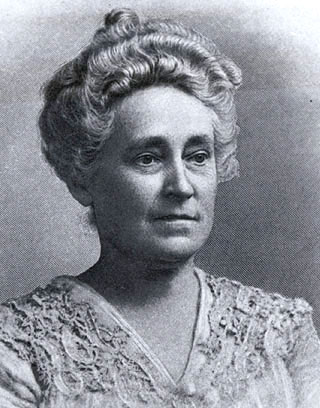
Sallie Southall Cotten (1846-1929) was one of the leading advocates of education for women in early-twentieth century North Carolina. Although a resident of Pitt County during her adult years, Cotten achieved national prominence for her work in women’s organizations. She was also a noted author of fiction and history. Cotten exemplified the ideal qualities of the educated, socially-engaged woman that came to be cultivated among students at East Carolina Teachers Training School. In recognition of her contributions to learning and culture, a dormitory at ECTTS was named in her honor.
A native of Virginia, Cotten moved to North Carolina after marrying Robert Randolph Cotten (1839-1928), a merchant and planter. In addition to raising a large family in Pitt County on plantation lands that she and her husband purchased and cultivated, Cotten established herself as an outstanding leader among women, playing key roles in a variety of women’s organizations at the local, state, and national levels. In 1893, Governor Elias Carr asked Cotten to serve as one of the coordinators for the North Carolina exhibit at the World’s Columbian Exposition in Chicago. Cotten distinguished herself in that capacity and was subsequently asked to serve in coordinating the North Carolina exhibits at the Atlanta and Charleston expositions.
Cotten authored several works including The White Doe (1901), a poetic account of the Lost Colony, and a work on African-American folklore, What Aunt Dorcas Told Little Elsie (1923). Cotten was an active member of the North Carolina Federation of Women’s Clubs, and authored a major history of that organization. A graduate of Greensboro Female College (1863), Cotten served as an educated role model for young ladies enrolled at East Carolina Teacher’s Training School. As a conservative progressive, she advanced the cause of female empowerment through clubs and education, but never supported enfranchisement for women.
Her racial views were no more progressive than those of other prominent Democrats of her day, such as Charles B. Aycock and Thomas J. Jarvis. Indeed, Cotten’s fiction can even be read as a literary expression of white supremacy. However, it was due to her untiring support for women’s education that she became the namesake of various scholarships for women established in North Carolina.
Sources:
- Cotten, Sallie Southall. The White Doe: The Fate of Virginia Dare, An Indian Legend. Philadelphia: J. B. Lippincott Company, 1901.
- _____ . What Aunt Dorcas Told Little Elsie. Charlotte: Queen City Print Company, 1923.
- Cotten Family Papers, 1892-1958 (collection no. 03589). The Southern Historical Collection. Louis Round Wilson Special Collections Library. University of North Carolina at Chapel Hill. http://www2.lib.unc.edu/mss/inv/c/Cotten_Family.html
- Gillespie, Michele and Sally McMillen, eds. North Carolina Women: Their Lives and Times. Athens: University of Georgia Press, 2014.
- Smith, Margaret S. “Sallie Southall Cotten: Organized Womanhood Comes to North Carolina.” In Stephenson, William. Sallie Southall Cotten: A Woman’s Life in North Carolina. Greenville, NC: Pamlico Press, 1987.
More from Digital Collections




